Acute Mental Health Nursing Theory
VerifiedAdded on 2023/06/11
|9
|2816
|365
AI Summary
This report discusses the impact of positive and negative symptoms of schizophrenia, the role and skills necessary for mental healthcare nurses, and therapeutic and pharmacological interventions for schizophrenia. The report also includes various types of therapy and medication used to treat schizophrenia.
Contribute Materials
Your contribution can guide someone’s learning journey. Share your
documents today.
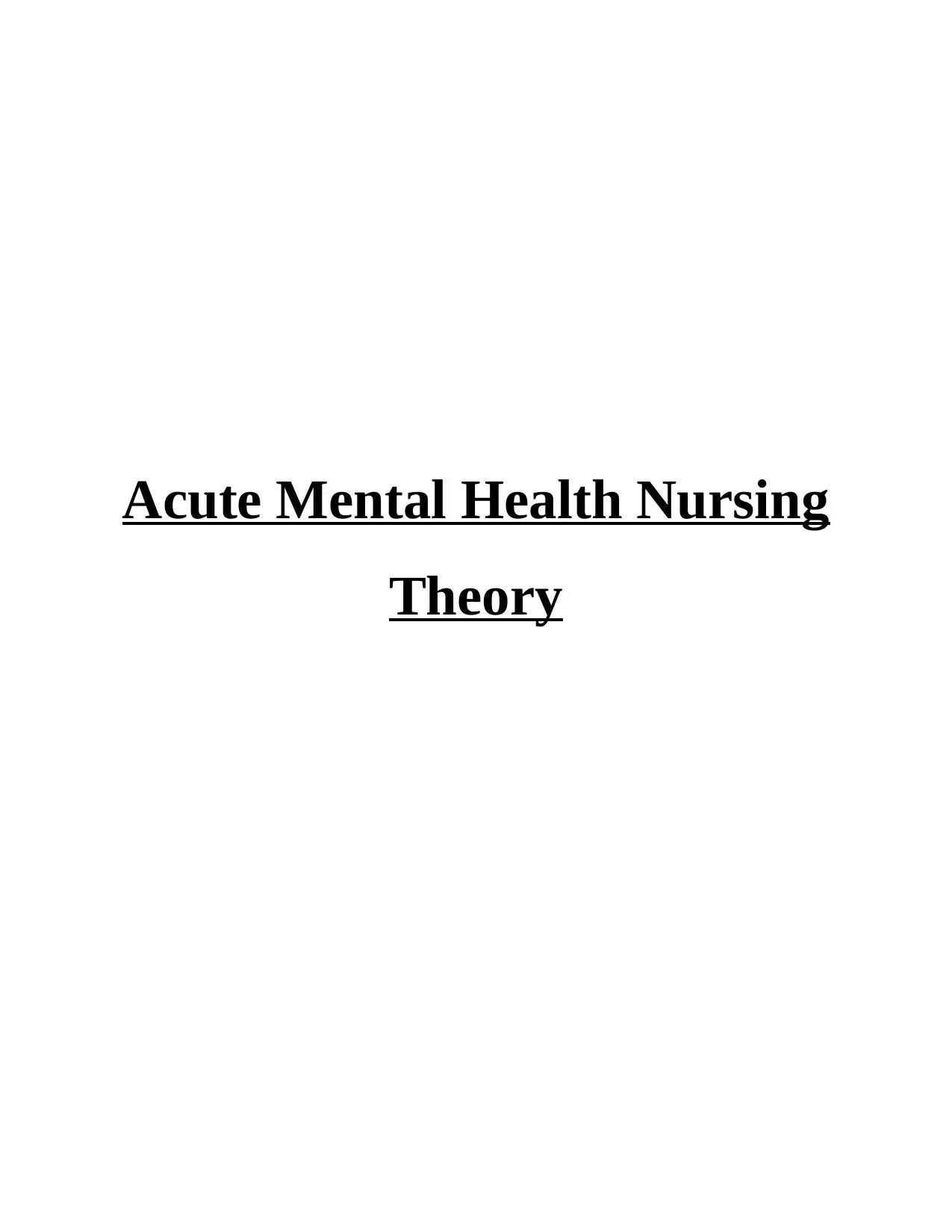
Acute Mental Health Nursing
Theory
Theory
Secure Best Marks with AI Grader
Need help grading? Try our AI Grader for instant feedback on your assignments.
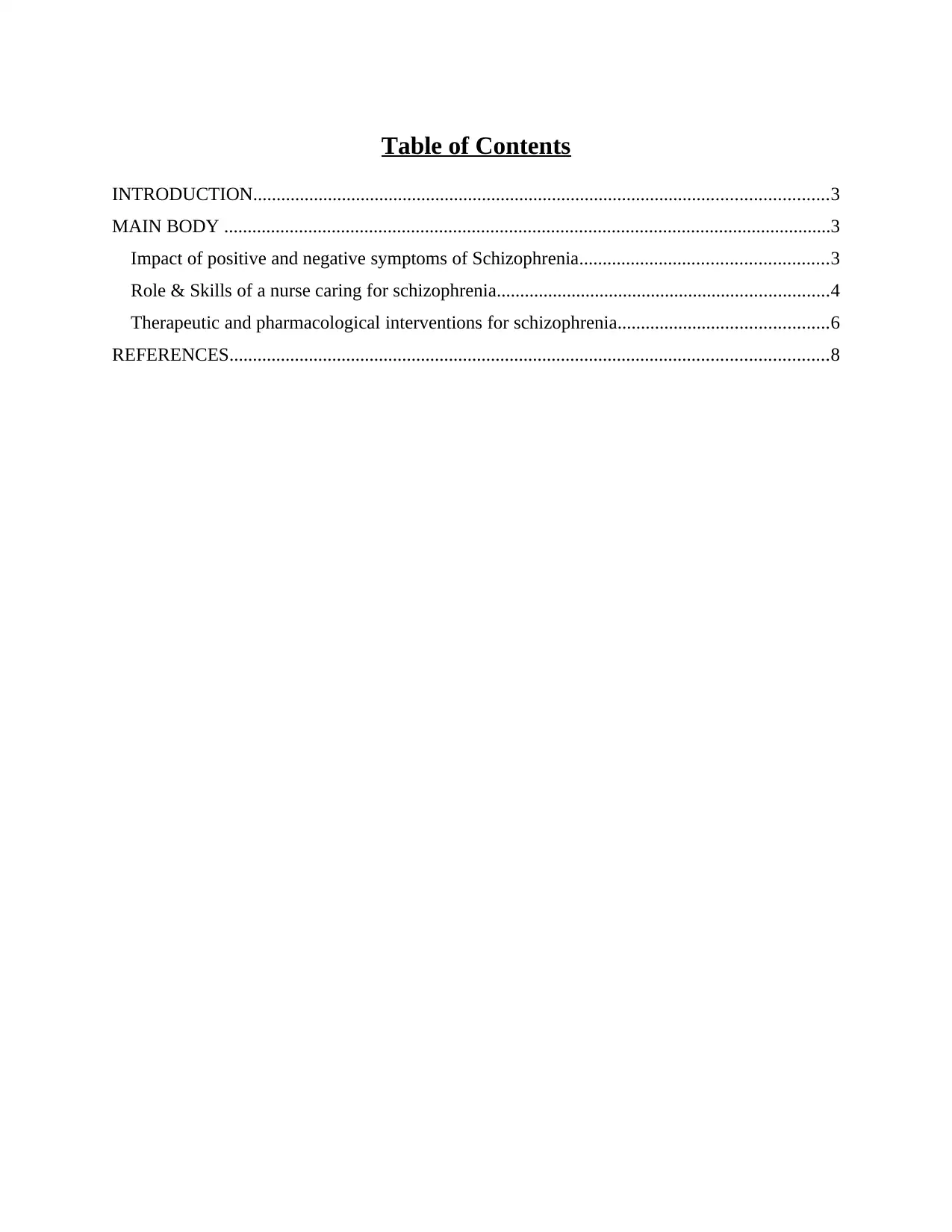
Table of Contents
INTRODUCTION...........................................................................................................................3
MAIN BODY ..................................................................................................................................3
Impact of positive and negative symptoms of Schizophrenia.....................................................3
Role & Skills of a nurse caring for schizophrenia.......................................................................4
Therapeutic and pharmacological interventions for schizophrenia.............................................6
REFERENCES................................................................................................................................8
INTRODUCTION...........................................................................................................................3
MAIN BODY ..................................................................................................................................3
Impact of positive and negative symptoms of Schizophrenia.....................................................3
Role & Skills of a nurse caring for schizophrenia.......................................................................4
Therapeutic and pharmacological interventions for schizophrenia.............................................6
REFERENCES................................................................................................................................8
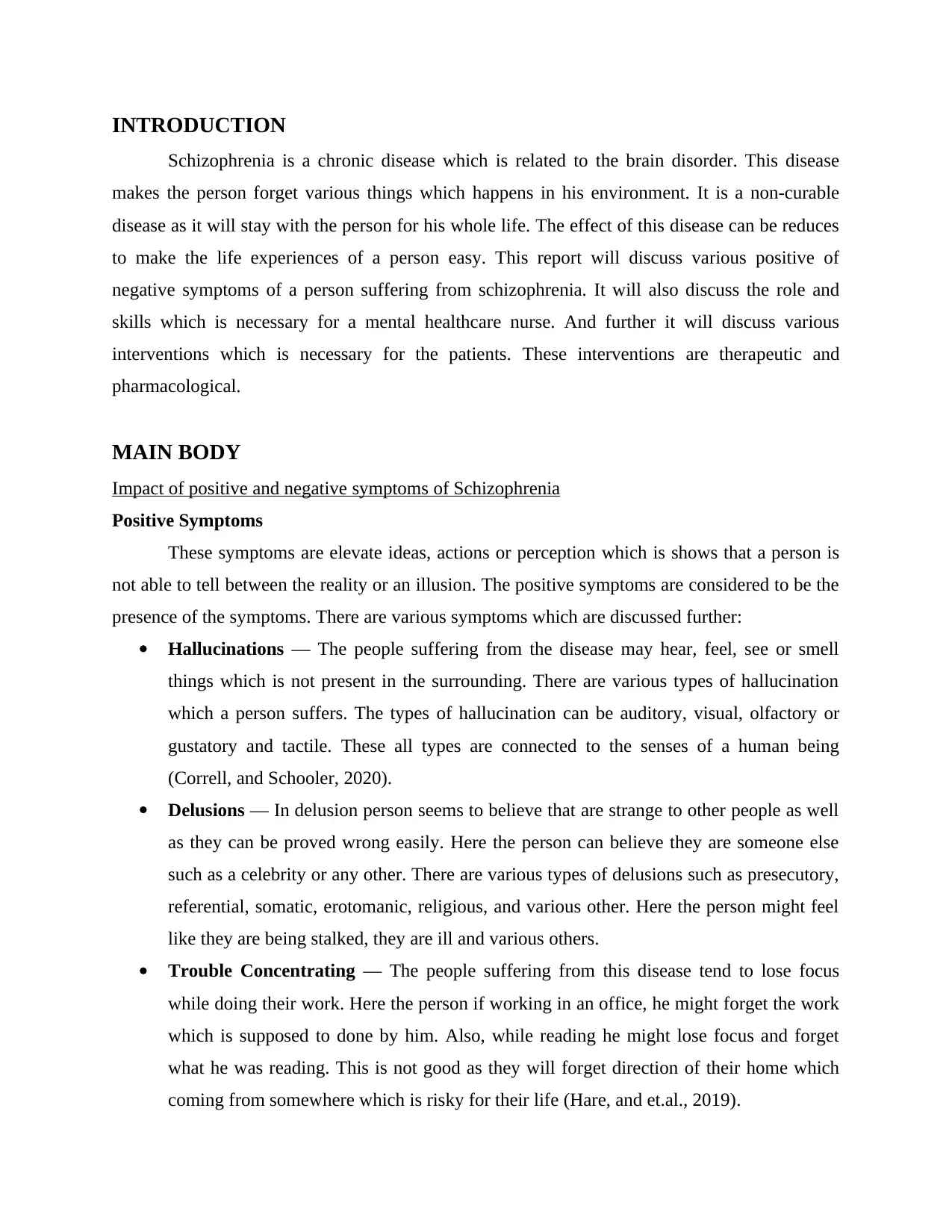
INTRODUCTION
Schizophrenia is a chronic disease which is related to the brain disorder. This disease
makes the person forget various things which happens in his environment. It is a non-curable
disease as it will stay with the person for his whole life. The effect of this disease can be reduces
to make the life experiences of a person easy. This report will discuss various positive of
negative symptoms of a person suffering from schizophrenia. It will also discuss the role and
skills which is necessary for a mental healthcare nurse. And further it will discuss various
interventions which is necessary for the patients. These interventions are therapeutic and
pharmacological.
MAIN BODY
Impact of positive and negative symptoms of Schizophrenia
Positive Symptoms
These symptoms are elevate ideas, actions or perception which is shows that a person is
not able to tell between the reality or an illusion. The positive symptoms are considered to be the
presence of the symptoms. There are various symptoms which are discussed further:
Hallucinations — The people suffering from the disease may hear, feel, see or smell
things which is not present in the surrounding. There are various types of hallucination
which a person suffers. The types of hallucination can be auditory, visual, olfactory or
gustatory and tactile. These all types are connected to the senses of a human being
(Correll, and Schooler, 2020).
Delusions — In delusion person seems to believe that are strange to other people as well
as they can be proved wrong easily. Here the person can believe they are someone else
such as a celebrity or any other. There are various types of delusions such as presecutory,
referential, somatic, erotomanic, religious, and various other. Here the person might feel
like they are being stalked, they are ill and various others.
Trouble Concentrating — The people suffering from this disease tend to lose focus
while doing their work. Here the person if working in an office, he might forget the work
which is supposed to done by him. Also, while reading he might lose focus and forget
what he was reading. This is not good as they will forget direction of their home which
coming from somewhere which is risky for their life (Hare, and et.al., 2019).
Schizophrenia is a chronic disease which is related to the brain disorder. This disease
makes the person forget various things which happens in his environment. It is a non-curable
disease as it will stay with the person for his whole life. The effect of this disease can be reduces
to make the life experiences of a person easy. This report will discuss various positive of
negative symptoms of a person suffering from schizophrenia. It will also discuss the role and
skills which is necessary for a mental healthcare nurse. And further it will discuss various
interventions which is necessary for the patients. These interventions are therapeutic and
pharmacological.
MAIN BODY
Impact of positive and negative symptoms of Schizophrenia
Positive Symptoms
These symptoms are elevate ideas, actions or perception which is shows that a person is
not able to tell between the reality or an illusion. The positive symptoms are considered to be the
presence of the symptoms. There are various symptoms which are discussed further:
Hallucinations — The people suffering from the disease may hear, feel, see or smell
things which is not present in the surrounding. There are various types of hallucination
which a person suffers. The types of hallucination can be auditory, visual, olfactory or
gustatory and tactile. These all types are connected to the senses of a human being
(Correll, and Schooler, 2020).
Delusions — In delusion person seems to believe that are strange to other people as well
as they can be proved wrong easily. Here the person can believe they are someone else
such as a celebrity or any other. There are various types of delusions such as presecutory,
referential, somatic, erotomanic, religious, and various other. Here the person might feel
like they are being stalked, they are ill and various others.
Trouble Concentrating — The people suffering from this disease tend to lose focus
while doing their work. Here the person if working in an office, he might forget the work
which is supposed to done by him. Also, while reading he might lose focus and forget
what he was reading. This is not good as they will forget direction of their home which
coming from somewhere which is risky for their life (Hare, and et.al., 2019).
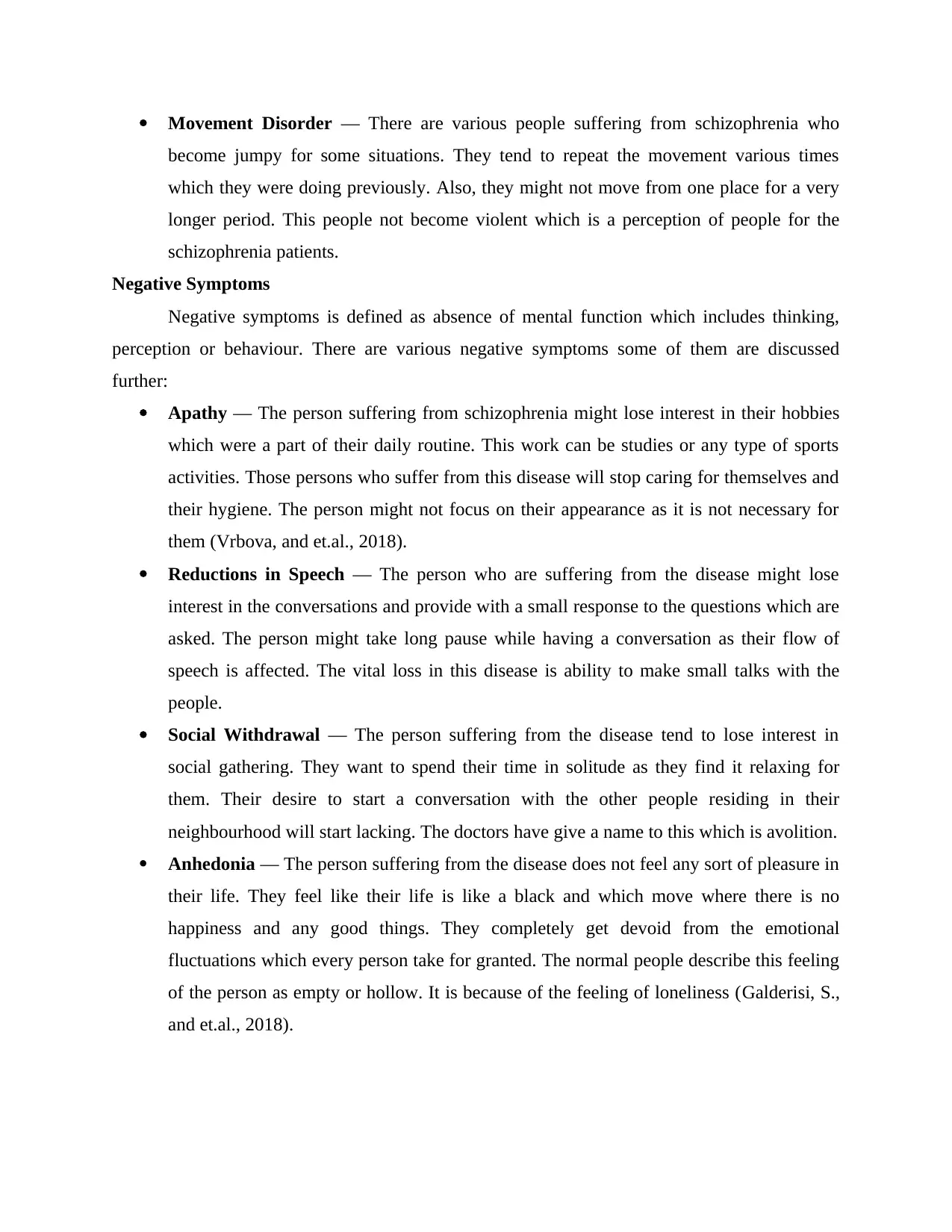
Movement Disorder — There are various people suffering from schizophrenia who
become jumpy for some situations. They tend to repeat the movement various times
which they were doing previously. Also, they might not move from one place for a very
longer period. This people not become violent which is a perception of people for the
schizophrenia patients.
Negative Symptoms
Negative symptoms is defined as absence of mental function which includes thinking,
perception or behaviour. There are various negative symptoms some of them are discussed
further:
Apathy — The person suffering from schizophrenia might lose interest in their hobbies
which were a part of their daily routine. This work can be studies or any type of sports
activities. Those persons who suffer from this disease will stop caring for themselves and
their hygiene. The person might not focus on their appearance as it is not necessary for
them (Vrbova, and et.al., 2018).
Reductions in Speech — The person who are suffering from the disease might lose
interest in the conversations and provide with a small response to the questions which are
asked. The person might take long pause while having a conversation as their flow of
speech is affected. The vital loss in this disease is ability to make small talks with the
people.
Social Withdrawal — The person suffering from the disease tend to lose interest in
social gathering. They want to spend their time in solitude as they find it relaxing for
them. Their desire to start a conversation with the other people residing in their
neighbourhood will start lacking. The doctors have give a name to this which is avolition.
Anhedonia — The person suffering from the disease does not feel any sort of pleasure in
their life. They feel like their life is like a black and which move where there is no
happiness and any good things. They completely get devoid from the emotional
fluctuations which every person take for granted. The normal people describe this feeling
of the person as empty or hollow. It is because of the feeling of loneliness (Galderisi, S.,
and et.al., 2018).
become jumpy for some situations. They tend to repeat the movement various times
which they were doing previously. Also, they might not move from one place for a very
longer period. This people not become violent which is a perception of people for the
schizophrenia patients.
Negative Symptoms
Negative symptoms is defined as absence of mental function which includes thinking,
perception or behaviour. There are various negative symptoms some of them are discussed
further:
Apathy — The person suffering from schizophrenia might lose interest in their hobbies
which were a part of their daily routine. This work can be studies or any type of sports
activities. Those persons who suffer from this disease will stop caring for themselves and
their hygiene. The person might not focus on their appearance as it is not necessary for
them (Vrbova, and et.al., 2018).
Reductions in Speech — The person who are suffering from the disease might lose
interest in the conversations and provide with a small response to the questions which are
asked. The person might take long pause while having a conversation as their flow of
speech is affected. The vital loss in this disease is ability to make small talks with the
people.
Social Withdrawal — The person suffering from the disease tend to lose interest in
social gathering. They want to spend their time in solitude as they find it relaxing for
them. Their desire to start a conversation with the other people residing in their
neighbourhood will start lacking. The doctors have give a name to this which is avolition.
Anhedonia — The person suffering from the disease does not feel any sort of pleasure in
their life. They feel like their life is like a black and which move where there is no
happiness and any good things. They completely get devoid from the emotional
fluctuations which every person take for granted. The normal people describe this feeling
of the person as empty or hollow. It is because of the feeling of loneliness (Galderisi, S.,
and et.al., 2018).
Secure Best Marks with AI Grader
Need help grading? Try our AI Grader for instant feedback on your assignments.
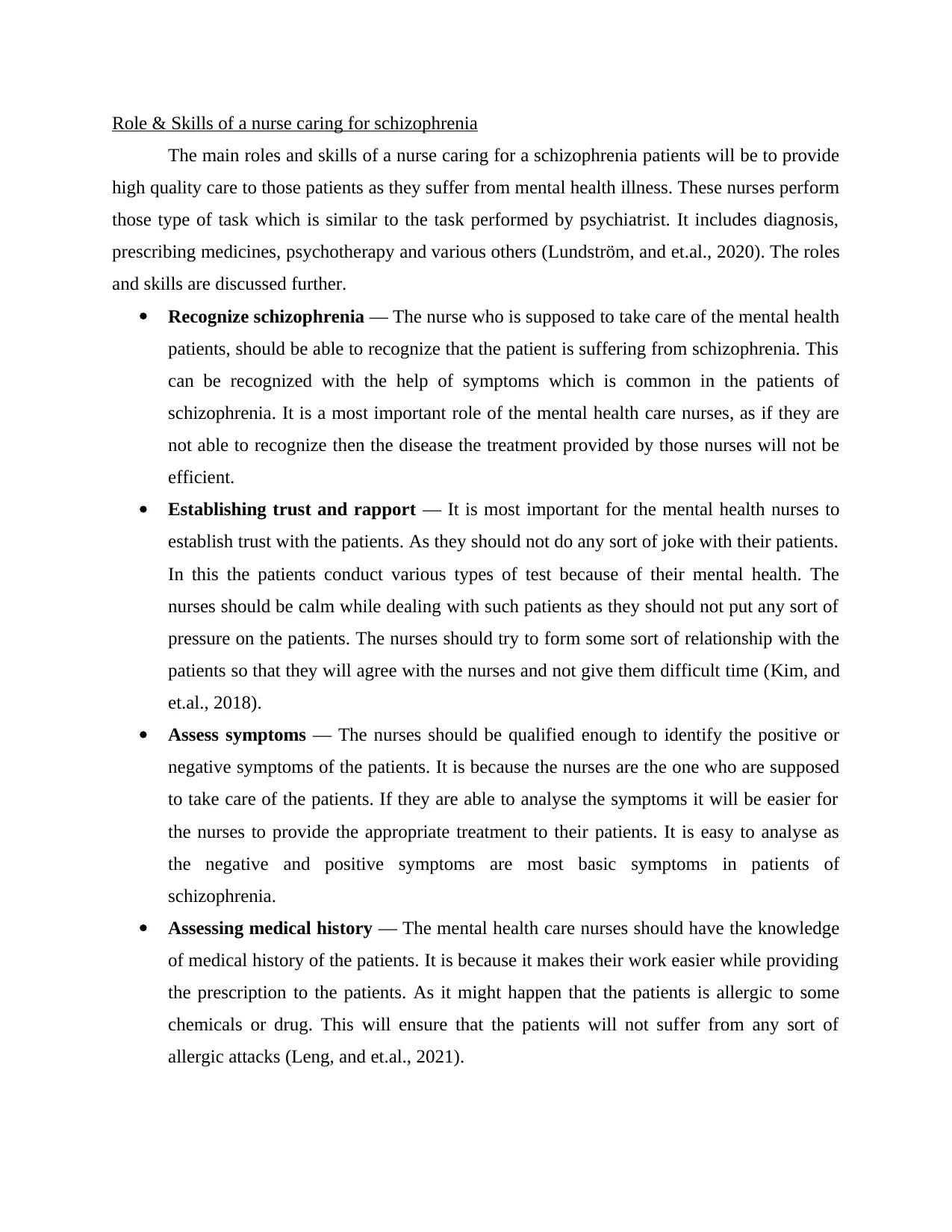
Role & Skills of a nurse caring for schizophrenia
The main roles and skills of a nurse caring for a schizophrenia patients will be to provide
high quality care to those patients as they suffer from mental health illness. These nurses perform
those type of task which is similar to the task performed by psychiatrist. It includes diagnosis,
prescribing medicines, psychotherapy and various others (Lundström, and et.al., 2020). The roles
and skills are discussed further.
Recognize schizophrenia — The nurse who is supposed to take care of the mental health
patients, should be able to recognize that the patient is suffering from schizophrenia. This
can be recognized with the help of symptoms which is common in the patients of
schizophrenia. It is a most important role of the mental health care nurses, as if they are
not able to recognize then the disease the treatment provided by those nurses will not be
efficient.
Establishing trust and rapport — It is most important for the mental health nurses to
establish trust with the patients. As they should not do any sort of joke with their patients.
In this the patients conduct various types of test because of their mental health. The
nurses should be calm while dealing with such patients as they should not put any sort of
pressure on the patients. The nurses should try to form some sort of relationship with the
patients so that they will agree with the nurses and not give them difficult time (Kim, and
et.al., 2018).
Assess symptoms — The nurses should be qualified enough to identify the positive or
negative symptoms of the patients. It is because the nurses are the one who are supposed
to take care of the patients. If they are able to analyse the symptoms it will be easier for
the nurses to provide the appropriate treatment to their patients. It is easy to analyse as
the negative and positive symptoms are most basic symptoms in patients of
schizophrenia.
Assessing medical history — The mental health care nurses should have the knowledge
of medical history of the patients. It is because it makes their work easier while providing
the prescription to the patients. As it might happen that the patients is allergic to some
chemicals or drug. This will ensure that the patients will not suffer from any sort of
allergic attacks (Leng, and et.al., 2021).
The main roles and skills of a nurse caring for a schizophrenia patients will be to provide
high quality care to those patients as they suffer from mental health illness. These nurses perform
those type of task which is similar to the task performed by psychiatrist. It includes diagnosis,
prescribing medicines, psychotherapy and various others (Lundström, and et.al., 2020). The roles
and skills are discussed further.
Recognize schizophrenia — The nurse who is supposed to take care of the mental health
patients, should be able to recognize that the patient is suffering from schizophrenia. This
can be recognized with the help of symptoms which is common in the patients of
schizophrenia. It is a most important role of the mental health care nurses, as if they are
not able to recognize then the disease the treatment provided by those nurses will not be
efficient.
Establishing trust and rapport — It is most important for the mental health nurses to
establish trust with the patients. As they should not do any sort of joke with their patients.
In this the patients conduct various types of test because of their mental health. The
nurses should be calm while dealing with such patients as they should not put any sort of
pressure on the patients. The nurses should try to form some sort of relationship with the
patients so that they will agree with the nurses and not give them difficult time (Kim, and
et.al., 2018).
Assess symptoms — The nurses should be qualified enough to identify the positive or
negative symptoms of the patients. It is because the nurses are the one who are supposed
to take care of the patients. If they are able to analyse the symptoms it will be easier for
the nurses to provide the appropriate treatment to their patients. It is easy to analyse as
the negative and positive symptoms are most basic symptoms in patients of
schizophrenia.
Assessing medical history — The mental health care nurses should have the knowledge
of medical history of the patients. It is because it makes their work easier while providing
the prescription to the patients. As it might happen that the patients is allergic to some
chemicals or drug. This will ensure that the patients will not suffer from any sort of
allergic attacks (Leng, and et.al., 2021).
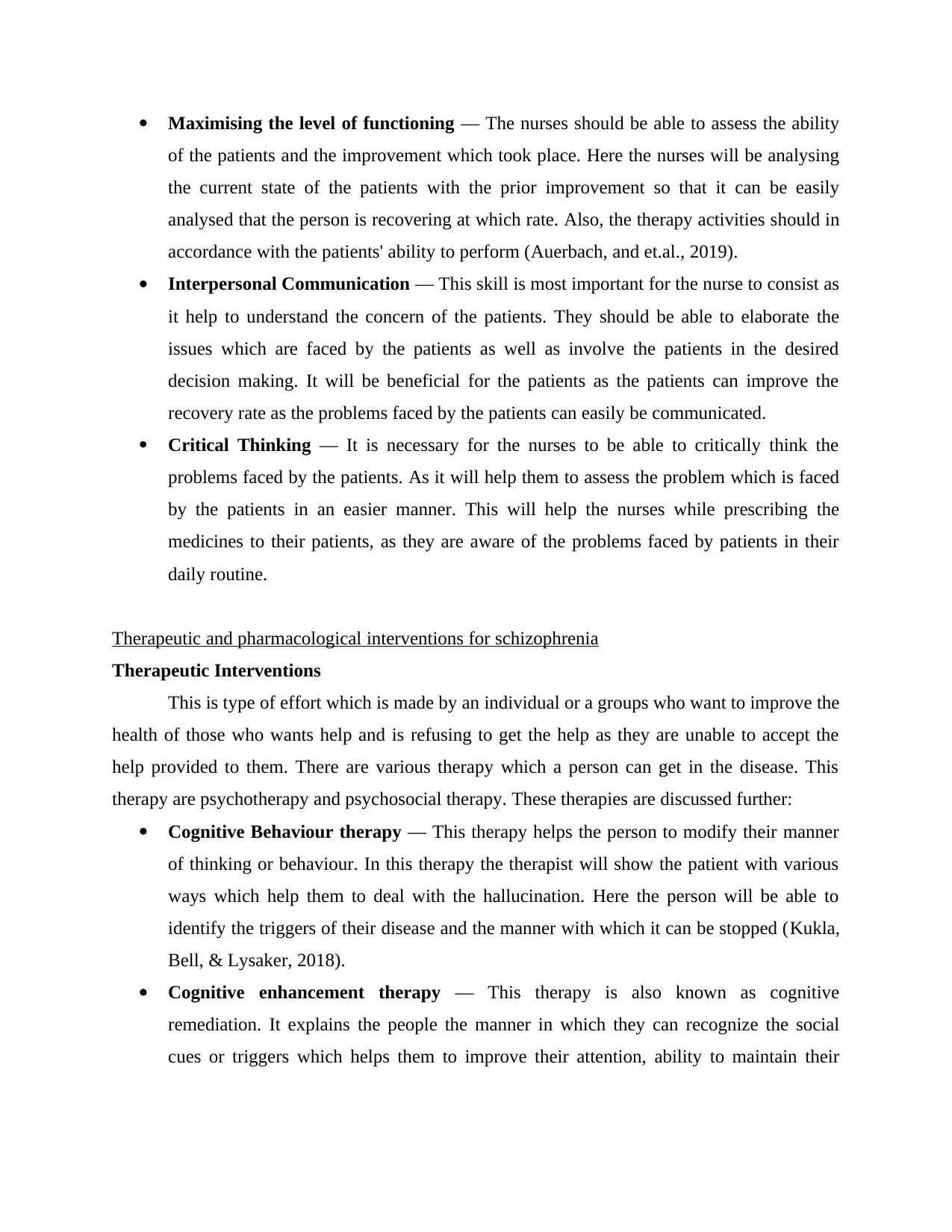
Maximising the level of functioning — The nurses should be able to assess the ability
of the patients and the improvement which took place. Here the nurses will be analysing
the current state of the patients with the prior improvement so that it can be easily
analysed that the person is recovering at which rate. Also, the therapy activities should in
accordance with the patients' ability to perform (Auerbach, and et.al., 2019).
Interpersonal Communication — This skill is most important for the nurse to consist as
it help to understand the concern of the patients. They should be able to elaborate the
issues which are faced by the patients as well as involve the patients in the desired
decision making. It will be beneficial for the patients as the patients can improve the
recovery rate as the problems faced by the patients can easily be communicated.
Critical Thinking — It is necessary for the nurses to be able to critically think the
problems faced by the patients. As it will help them to assess the problem which is faced
by the patients in an easier manner. This will help the nurses while prescribing the
medicines to their patients, as they are aware of the problems faced by patients in their
daily routine.
Therapeutic and pharmacological interventions for schizophrenia
Therapeutic Interventions
This is type of effort which is made by an individual or a groups who want to improve the
health of those who wants help and is refusing to get the help as they are unable to accept the
help provided to them. There are various therapy which a person can get in the disease. This
therapy are psychotherapy and psychosocial therapy. These therapies are discussed further:
Cognitive Behaviour therapy — This therapy helps the person to modify their manner
of thinking or behaviour. In this therapy the therapist will show the patient with various
ways which help them to deal with the hallucination. Here the person will be able to
identify the triggers of their disease and the manner with which it can be stopped (Kukla,
Bell, & Lysaker, 2018).
Cognitive enhancement therapy — This therapy is also known as cognitive
remediation. It explains the people the manner in which they can recognize the social
cues or triggers which helps them to improve their attention, ability to maintain their
of the patients and the improvement which took place. Here the nurses will be analysing
the current state of the patients with the prior improvement so that it can be easily
analysed that the person is recovering at which rate. Also, the therapy activities should in
accordance with the patients' ability to perform (Auerbach, and et.al., 2019).
Interpersonal Communication — This skill is most important for the nurse to consist as
it help to understand the concern of the patients. They should be able to elaborate the
issues which are faced by the patients as well as involve the patients in the desired
decision making. It will be beneficial for the patients as the patients can improve the
recovery rate as the problems faced by the patients can easily be communicated.
Critical Thinking — It is necessary for the nurses to be able to critically think the
problems faced by the patients. As it will help them to assess the problem which is faced
by the patients in an easier manner. This will help the nurses while prescribing the
medicines to their patients, as they are aware of the problems faced by patients in their
daily routine.
Therapeutic and pharmacological interventions for schizophrenia
Therapeutic Interventions
This is type of effort which is made by an individual or a groups who want to improve the
health of those who wants help and is refusing to get the help as they are unable to accept the
help provided to them. There are various therapy which a person can get in the disease. This
therapy are psychotherapy and psychosocial therapy. These therapies are discussed further:
Cognitive Behaviour therapy — This therapy helps the person to modify their manner
of thinking or behaviour. In this therapy the therapist will show the patient with various
ways which help them to deal with the hallucination. Here the person will be able to
identify the triggers of their disease and the manner with which it can be stopped (Kukla,
Bell, & Lysaker, 2018).
Cognitive enhancement therapy — This therapy is also known as cognitive
remediation. It explains the people the manner in which they can recognize the social
cues or triggers which helps them to improve their attention, ability to maintain their
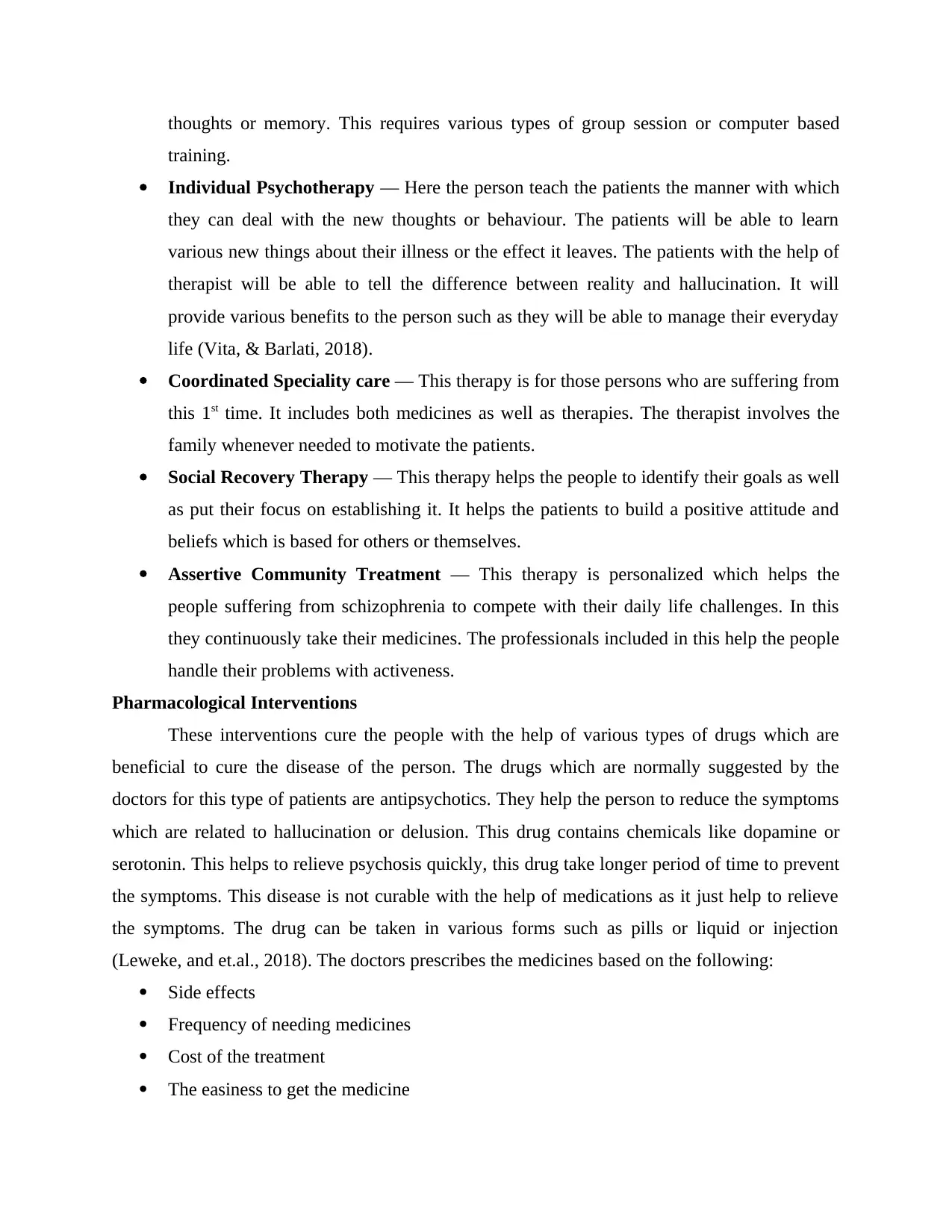
thoughts or memory. This requires various types of group session or computer based
training.
Individual Psychotherapy — Here the person teach the patients the manner with which
they can deal with the new thoughts or behaviour. The patients will be able to learn
various new things about their illness or the effect it leaves. The patients with the help of
therapist will be able to tell the difference between reality and hallucination. It will
provide various benefits to the person such as they will be able to manage their everyday
life (Vita, & Barlati, 2018).
Coordinated Speciality care — This therapy is for those persons who are suffering from
this 1st time. It includes both medicines as well as therapies. The therapist involves the
family whenever needed to motivate the patients.
Social Recovery Therapy — This therapy helps the people to identify their goals as well
as put their focus on establishing it. It helps the patients to build a positive attitude and
beliefs which is based for others or themselves.
Assertive Community Treatment — This therapy is personalized which helps the
people suffering from schizophrenia to compete with their daily life challenges. In this
they continuously take their medicines. The professionals included in this help the people
handle their problems with activeness.
Pharmacological Interventions
These interventions cure the people with the help of various types of drugs which are
beneficial to cure the disease of the person. The drugs which are normally suggested by the
doctors for this type of patients are antipsychotics. They help the person to reduce the symptoms
which are related to hallucination or delusion. This drug contains chemicals like dopamine or
serotonin. This helps to relieve psychosis quickly, this drug take longer period of time to prevent
the symptoms. This disease is not curable with the help of medications as it just help to relieve
the symptoms. The drug can be taken in various forms such as pills or liquid or injection
(Leweke, and et.al., 2018). The doctors prescribes the medicines based on the following:
Side effects
Frequency of needing medicines
Cost of the treatment
The easiness to get the medicine
training.
Individual Psychotherapy — Here the person teach the patients the manner with which
they can deal with the new thoughts or behaviour. The patients will be able to learn
various new things about their illness or the effect it leaves. The patients with the help of
therapist will be able to tell the difference between reality and hallucination. It will
provide various benefits to the person such as they will be able to manage their everyday
life (Vita, & Barlati, 2018).
Coordinated Speciality care — This therapy is for those persons who are suffering from
this 1st time. It includes both medicines as well as therapies. The therapist involves the
family whenever needed to motivate the patients.
Social Recovery Therapy — This therapy helps the people to identify their goals as well
as put their focus on establishing it. It helps the patients to build a positive attitude and
beliefs which is based for others or themselves.
Assertive Community Treatment — This therapy is personalized which helps the
people suffering from schizophrenia to compete with their daily life challenges. In this
they continuously take their medicines. The professionals included in this help the people
handle their problems with activeness.
Pharmacological Interventions
These interventions cure the people with the help of various types of drugs which are
beneficial to cure the disease of the person. The drugs which are normally suggested by the
doctors for this type of patients are antipsychotics. They help the person to reduce the symptoms
which are related to hallucination or delusion. This drug contains chemicals like dopamine or
serotonin. This helps to relieve psychosis quickly, this drug take longer period of time to prevent
the symptoms. This disease is not curable with the help of medications as it just help to relieve
the symptoms. The drug can be taken in various forms such as pills or liquid or injection
(Leweke, and et.al., 2018). The doctors prescribes the medicines based on the following:
Side effects
Frequency of needing medicines
Cost of the treatment
The easiness to get the medicine
Paraphrase This Document
Need a fresh take? Get an instant paraphrase of this document with our AI Paraphraser
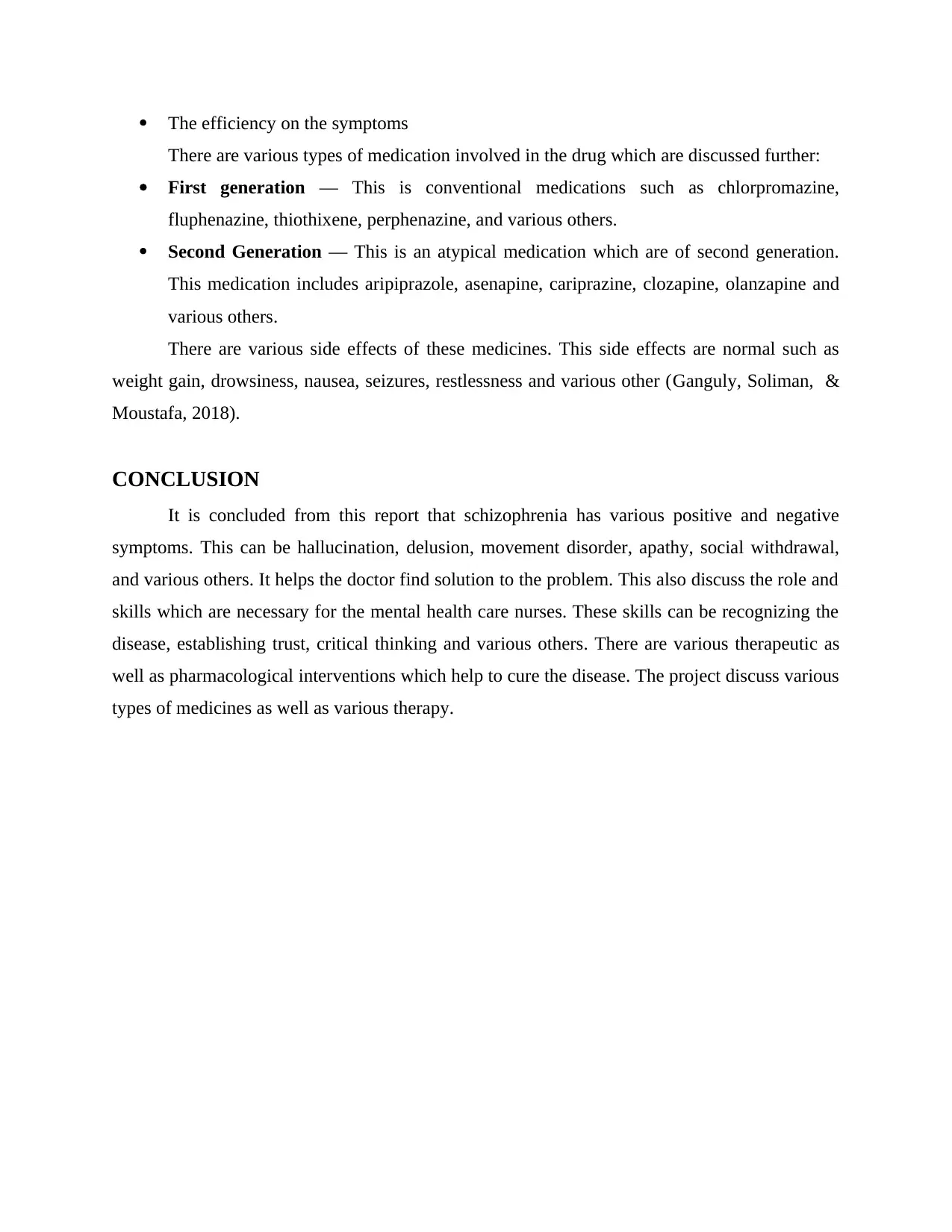
The efficiency on the symptoms
There are various types of medication involved in the drug which are discussed further:
First generation — This is conventional medications such as chlorpromazine,
fluphenazine, thiothixene, perphenazine, and various others.
Second Generation — This is an atypical medication which are of second generation.
This medication includes aripiprazole, asenapine, cariprazine, clozapine, olanzapine and
various others.
There are various side effects of these medicines. This side effects are normal such as
weight gain, drowsiness, nausea, seizures, restlessness and various other (Ganguly, Soliman, &
Moustafa, 2018).
CONCLUSION
It is concluded from this report that schizophrenia has various positive and negative
symptoms. This can be hallucination, delusion, movement disorder, apathy, social withdrawal,
and various others. It helps the doctor find solution to the problem. This also discuss the role and
skills which are necessary for the mental health care nurses. These skills can be recognizing the
disease, establishing trust, critical thinking and various others. There are various therapeutic as
well as pharmacological interventions which help to cure the disease. The project discuss various
types of medicines as well as various therapy.
There are various types of medication involved in the drug which are discussed further:
First generation — This is conventional medications such as chlorpromazine,
fluphenazine, thiothixene, perphenazine, and various others.
Second Generation — This is an atypical medication which are of second generation.
This medication includes aripiprazole, asenapine, cariprazine, clozapine, olanzapine and
various others.
There are various side effects of these medicines. This side effects are normal such as
weight gain, drowsiness, nausea, seizures, restlessness and various other (Ganguly, Soliman, &
Moustafa, 2018).
CONCLUSION
It is concluded from this report that schizophrenia has various positive and negative
symptoms. This can be hallucination, delusion, movement disorder, apathy, social withdrawal,
and various others. It helps the doctor find solution to the problem. This also discuss the role and
skills which are necessary for the mental health care nurses. These skills can be recognizing the
disease, establishing trust, critical thinking and various others. There are various therapeutic as
well as pharmacological interventions which help to cure the disease. The project discuss various
types of medicines as well as various therapy.
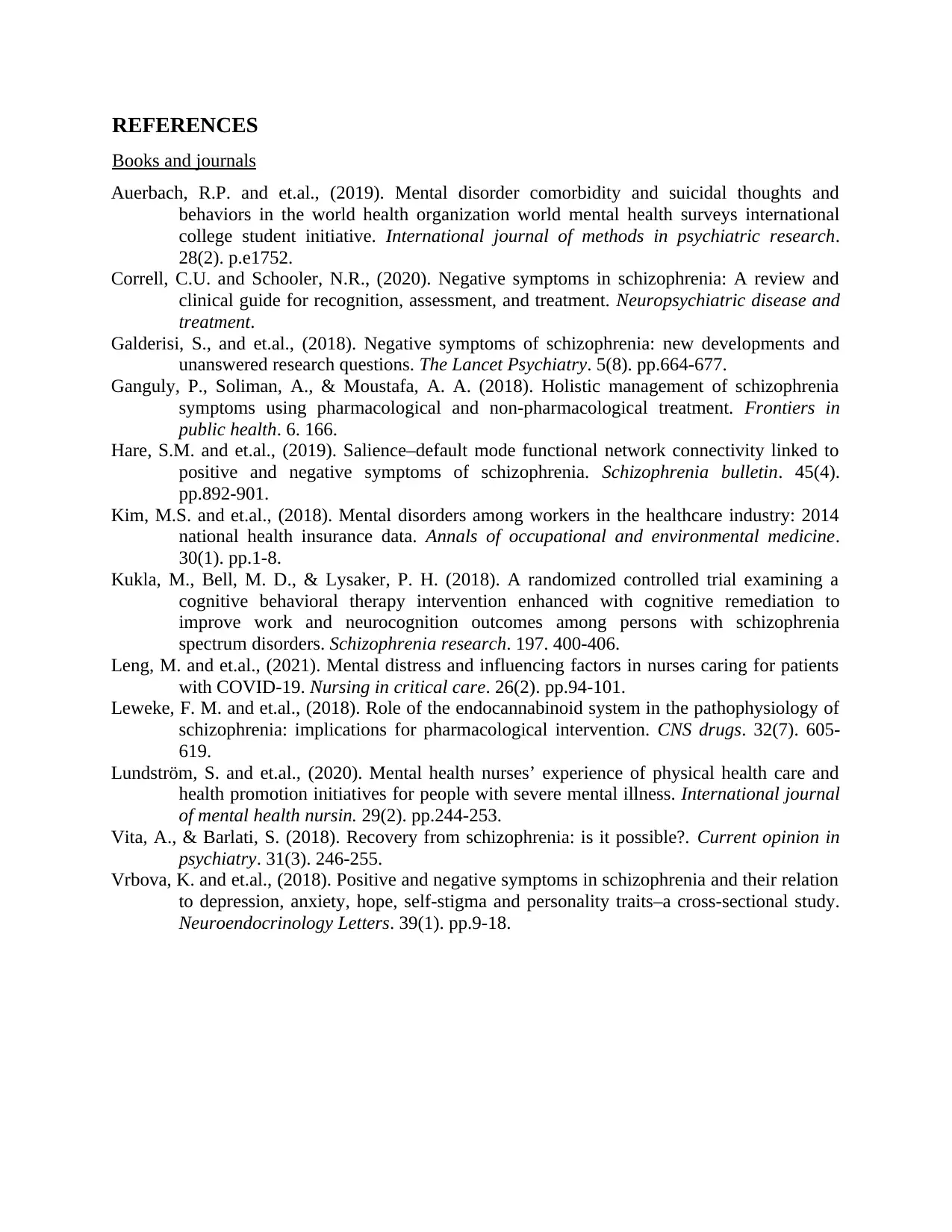
REFERENCES
Books and journals
Auerbach, R.P. and et.al., (2019). Mental disorder comorbidity and suicidal thoughts and
behaviors in the world health organization world mental health surveys international
college student initiative. International journal of methods in psychiatric research.
28(2). p.e1752.
Correll, C.U. and Schooler, N.R., (2020). Negative symptoms in schizophrenia: A review and
clinical guide for recognition, assessment, and treatment. Neuropsychiatric disease and
treatment.
Galderisi, S., and et.al., (2018). Negative symptoms of schizophrenia: new developments and
unanswered research questions. The Lancet Psychiatry. 5(8). pp.664-677.
Ganguly, P., Soliman, A., & Moustafa, A. A. (2018). Holistic management of schizophrenia
symptoms using pharmacological and non-pharmacological treatment. Frontiers in
public health. 6. 166.
Hare, S.M. and et.al., (2019). Salience–default mode functional network connectivity linked to
positive and negative symptoms of schizophrenia. Schizophrenia bulletin. 45(4).
pp.892-901.
Kim, M.S. and et.al., (2018). Mental disorders among workers in the healthcare industry: 2014
national health insurance data. Annals of occupational and environmental medicine.
30(1). pp.1-8.
Kukla, M., Bell, M. D., & Lysaker, P. H. (2018). A randomized controlled trial examining a
cognitive behavioral therapy intervention enhanced with cognitive remediation to
improve work and neurocognition outcomes among persons with schizophrenia
spectrum disorders. Schizophrenia research. 197. 400-406.
Leng, M. and et.al., (2021). Mental distress and influencing factors in nurses caring for patients
with COVID‐19. Nursing in critical care. 26(2). pp.94-101.
Leweke, F. M. and et.al., (2018). Role of the endocannabinoid system in the pathophysiology of
schizophrenia: implications for pharmacological intervention. CNS drugs. 32(7). 605-
619.
Lundström, S. and et.al., (2020). Mental health nurses’ experience of physical health care and
health promotion initiatives for people with severe mental illness. International journal
of mental health nursin. 29(2). pp.244-253.
Vita, A., & Barlati, S. (2018). Recovery from schizophrenia: is it possible?. Current opinion in
psychiatry. 31(3). 246-255.
Vrbova, K. and et.al., (2018). Positive and negative symptoms in schizophrenia and their relation
to depression, anxiety, hope, self-stigma and personality traits–a cross-sectional study.
Neuroendocrinology Letters. 39(1). pp.9-18.
Books and journals
Auerbach, R.P. and et.al., (2019). Mental disorder comorbidity and suicidal thoughts and
behaviors in the world health organization world mental health surveys international
college student initiative. International journal of methods in psychiatric research.
28(2). p.e1752.
Correll, C.U. and Schooler, N.R., (2020). Negative symptoms in schizophrenia: A review and
clinical guide for recognition, assessment, and treatment. Neuropsychiatric disease and
treatment.
Galderisi, S., and et.al., (2018). Negative symptoms of schizophrenia: new developments and
unanswered research questions. The Lancet Psychiatry. 5(8). pp.664-677.
Ganguly, P., Soliman, A., & Moustafa, A. A. (2018). Holistic management of schizophrenia
symptoms using pharmacological and non-pharmacological treatment. Frontiers in
public health. 6. 166.
Hare, S.M. and et.al., (2019). Salience–default mode functional network connectivity linked to
positive and negative symptoms of schizophrenia. Schizophrenia bulletin. 45(4).
pp.892-901.
Kim, M.S. and et.al., (2018). Mental disorders among workers in the healthcare industry: 2014
national health insurance data. Annals of occupational and environmental medicine.
30(1). pp.1-8.
Kukla, M., Bell, M. D., & Lysaker, P. H. (2018). A randomized controlled trial examining a
cognitive behavioral therapy intervention enhanced with cognitive remediation to
improve work and neurocognition outcomes among persons with schizophrenia
spectrum disorders. Schizophrenia research. 197. 400-406.
Leng, M. and et.al., (2021). Mental distress and influencing factors in nurses caring for patients
with COVID‐19. Nursing in critical care. 26(2). pp.94-101.
Leweke, F. M. and et.al., (2018). Role of the endocannabinoid system in the pathophysiology of
schizophrenia: implications for pharmacological intervention. CNS drugs. 32(7). 605-
619.
Lundström, S. and et.al., (2020). Mental health nurses’ experience of physical health care and
health promotion initiatives for people with severe mental illness. International journal
of mental health nursin. 29(2). pp.244-253.
Vita, A., & Barlati, S. (2018). Recovery from schizophrenia: is it possible?. Current opinion in
psychiatry. 31(3). 246-255.
Vrbova, K. and et.al., (2018). Positive and negative symptoms in schizophrenia and their relation
to depression, anxiety, hope, self-stigma and personality traits–a cross-sectional study.
Neuroendocrinology Letters. 39(1). pp.9-18.
1 out of 9
Related Documents
Your All-in-One AI-Powered Toolkit for Academic Success.
+13062052269
info@desklib.com
Available 24*7 on WhatsApp / Email
![[object Object]](/_next/static/media/star-bottom.7253800d.svg)
Unlock your academic potential
© 2024 | Zucol Services PVT LTD | All rights reserved.





